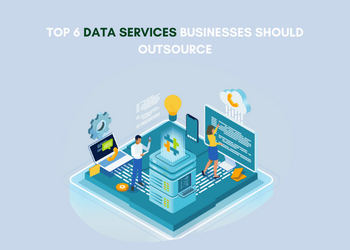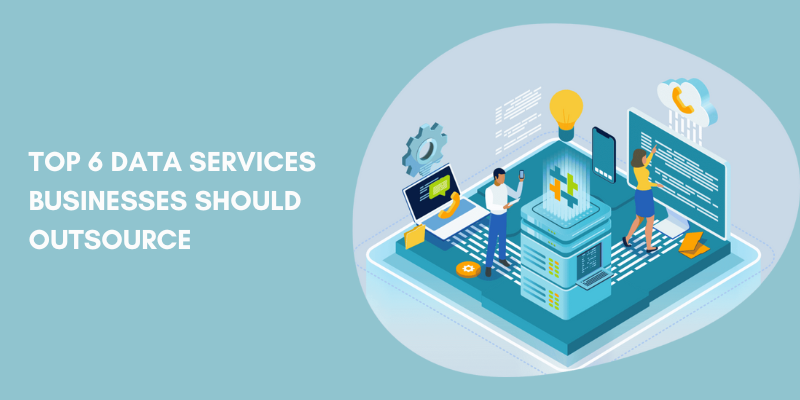Top 6 Data Services Businesses Should Outsource


If you’re thinking about outsourcing data processing services (or aren’t sure why or what to outsource to a third party without jeopardizing the security or integrity of your enterprise data), keep reading.
What is Data Service?
Data services in IT are third-party services that assist clients in managing data. Many uses of this term involve services known as “data as a service” (DaaS), there are web-delivered services provided by cloud vendors that perform various functions on data.
The definition of data services is quite broad. Data services can aid in collecting data from various parts of architecture or establishing a central data centre repository. Data services can handle data in transit or data storage. Data services could also perform various types of analytics on large data sets.
Why Should You Outsourcing Data Services?
There has never been a better time to pay attention to data. Data has taken centre stage in the creation of value around the world. It influences strategies, approaches, and ROI in a variety of ways. But, while that is important, so is the fact that data processing errors cost businesses millions of dollars each year.
It can easily become a significant risk for businesses for all that data (worth $274 billion, touted as a profitable initiative, dubbed the new corporate asset class). Data errors have serious consequences, ranging from poor insights and misdirected growth to billions of dollars in monetary losses.
For the past decade, gaining complete control over their data has been the top organizational goal. Despite this, we see businesses defeated by overflowing data year after year; we see poor performance and losses that could have been avoided if the underlying data had been cleaner, more accurate, or better organized. Furthermore, most businesses’ confidence in their data does not correspond to reality.
While most respondents in a Validity survey claimed to be data-driven enterprises, nearly 28% reported losing 10-14% of their revenue, and another 28% reported a 5-9% revenue impact due to poor data quality.
This points to one conclusion: data requires greater care and heavy-duty monitoring at the atomic level. Outsourcing becomes necessary when businesses fail to do so (for whatever reason).
What Kinds of Data-Based Services Are Commonly Outsourced?
Initially, businesses outsourced data-related activities that could be managed from an offshore location and were of little significance but consumed a lot of time. As data outsourcing services evolved, strengthened their infrastructure, began offering specializations, and ensured a more secure (mostly cloud-based) system, so did the requirements.
But, among that growing list, which services are currently being outsourced the most?
Those that require a significant time investment have no margin for error and become increasingly complex as they scale, and here they are:
1. Data Preparation (Sourcing, Cleansing, Enrichment)
Any data ecosystem is only as good or accurate as its smallest component. Two major obstacles prevent businesses from maintaining such thorough precision in a dataset.
- Obtaining timely access to relevant data
- Controlled processing ensures accuracy.
The only way to create a halfway decent database is to modify every possible source of relevant data and monitor them all at once (also known as data sourcing). Once formed, such a dataset is likely to be riddled with structural errors, rendering it useless until cleansing, validation, verification, appending, and other similar processing is completed. Without hard work, none of this would be possible.
Outsourcing data processing relieves the stress associated with data sourcing and preparation. Furthermore, such services are available as a package or separately, allowing businesses to select what they require while lowering costs easily. For example, a company with multiple moderately clean datasets can use data enrichment services to create a centralized database with validated entries.
2. Data Entry
Data entry requirements differ depending on the industry, business type, and data source. eCommerce data entry services, for example, appear very different from scientific data entry. Nonetheless, each one necessitates absolute precision because it serves as the foundation of a coherent database.
Most data entry services can easily handle copy-paste, document & pdf data entry, document scanning & indexing, image data entry, online and offline data entry, medical coding, and patient data entry.
3. Database Maintenance & Updates
Databases become obsolete (and thus useless) unless the data is constantly reviewed, stale entries are removed, and new entries are added regularly. This requires much effort as data sourcing and preparation because the database must be cleaned after each new addition. Frequent revision, monitoring, and modification are best left to database maintenance professionals.
4. Data Mining
Data mining is the ability to extract information from data determines its utility. Identifying patterns, discovering trends, separating them into observations, and determining their significance in a specific context, on the other hand, are tasks that heavily overlap with a deep understanding of databases, statistics, and machine learning. As a result, it is best left to a specialist with dedicated infrastructure and time on their hands.
5. Data Analytics
While data mining aids in the interpretation of a database and provides crude (but relevant) information, data analytics extracts actionable insights from the dataset. Both are essential for businesses because they ensure informed decision-making and efficient operations.
Data analytics, on the other hand, is a little more complicated because it delves into what the data represents and indicates.
Outsourcing data analytics gives you access to experts who know what to look for in a dataset, what questions to ask, and how to uncover information that can help your business. Furthermore, because most data analytics service providers use high-end tools and AI-based models for this task, it ensures the reliability of the uncovered insights.
6. Data Annotation
Data annotation services are currently one of the most in-demand outsourcing requirements. Their popularity has grown as AI/ML has gained mainstream attention, and B2B implementation of such models has accelerated. However, it is a highly technical process that necessitates the assistance of specialized professionals and constant supervision to produce appropriate results.
Outsourcing data annotation services helps enterprises evolve their machine learning projects faster, removing much of the stress associated with the project’s time-to-market. This allows businesses to remain competitive and relevant in their niche simultaneously.
The Advantages of Outsourcing Data Services
At its core, outsourcing is a solution for lowering operational costs. At least, that’s how it started. It is now synonymous with hiring specialized talent for a quick fix at a low cost without making any long-term commitment to retaining the service or the provider. While it is still a cost-cutting strategy, its deliverables have expanded across multiple dimensions.
Coincidentally, most organizations with a data problem require someone who can show up once in a while, gather all of their data, clean it up, modify it as needed, and then leave with half the pay of a regular data operator.
Outsourcing data processing or data entry services (or any of the above) can also be advantageous in the following ways.
- The in-house team is given more time to concentrate on core and critical business aspects.
- When employees are free of mundane, exhausting, and iterative tasks, their opportunities for advancement multiply.
- Outsourcing paves the way for more comprehensive risk analysis and mitigation.
- Outsourcing also provides businesses with global access to skilled resources.
- Scaling an outsourced team or its scope as needed is always available.
Bring Your Company to a Reliable Data Services Outsourcing Company
Outsourcing arose from the desire to reduce the costs of business processes; the industry is expected to exceed US$395.00 billion by 2022. (Statista, 2022). Given that the global market size of the IT outsourcing industry was only 92.5 billion US dollars in 2019, this exponential growth demonstrates the widespread adoption of this practice.
Following the market’s explosive growth, numerous data service outsourcing providers have emerged. Businesses looking for good consultants and service providers must tread carefully because data is not something to be taken lightly. To begin, determining the vendor’s capability for data storage and security and reviewing their portfolio, experience, technological expertise, and clientele diversity may be beneficial. Also, always determine your requirements before selecting a data processing service.



